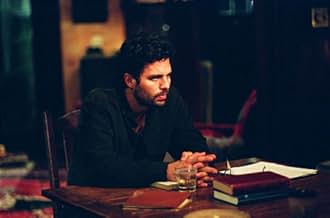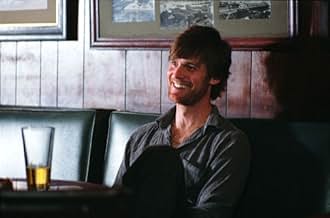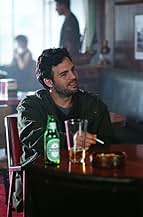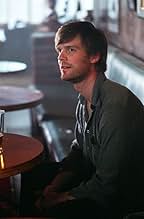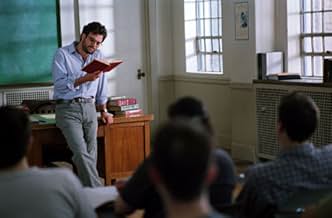IMDb-BEWERTUNG
6,2/10
10.291
IHRE BEWERTUNG
Füge eine Handlung in deiner Sprache hinzuAn indiscretion between two close friends tears down their respective marriages.An indiscretion between two close friends tears down their respective marriages.An indiscretion between two close friends tears down their respective marriages.
- Auszeichnungen
- 2 Gewinne & 4 Nominierungen insgesamt
Empfohlene Bewertungen
Not a heart-wrenching film but illuminates with precision the dynamics of friendship, marriage and adultery. It shows a potent portrait of two couples whose marriages are going to break; has an enormous power and tells some uncomfortable truths. In this movie actions have consequences that are not resolved with a hug or a cry. The four grown-ups (as well as their children who are perfectly aware of the situation) are very talented and all deliver passionate and compulsive performances. The atmosphere lingering in the air is what impressed me the most, being the flick filled with very expressive glances and electrical silences. Mark Ruffalo and Naomi Watts always very gifted.
John Curran presents a very unsettling view on fragile relationships. At the centre of the story there are two married couples and from their interactions one can easily conclude that there was once a lot of love within the couples and a strong friendship between them and now, well in the case of Hank and Edith, the love is vanishing into thin air. Edith still yearns for Hank's love but Hank is too self-absorbed in his self-perceived failure and careless about his wife's infidelity. Terry still deeply loves Jack who is going through a mid-life crisis (like Hank) and finds comfort, both sexual and emotional, with Edith. At the center of their relationships are the children of the respective couples who are the most vulnerable ones. The film is a shocking portrayal of relationships and friendships that have reached a stage where indifference, obligation, guilt, loneliness and despair take over. Curran also adds some doses of humour that is subtle and welcoming (at the same time non-intrusive).
The cinematography is fantastic and editing is wonderful. I especially liked how the camera jumps from one character to another, showing what they are going through, during a constant time period. The score contributes to the gloominess but in a non-intrusive and non-melodramatic way. It is rather gentle and flowing smoothly.
'We Don't Live Here Anymore' showcases four exceptional performances. Ruffalo is both hateful and sympathetic as Jack. The remarkable Laura Dern is explosive and fiery as Terry. Her Terry is the strongest of the four and Dern is both gripping and haunting. Both Ruffalo and Dern benefit from well-defined roles (but even otherwise they are great actors as has been evident in their other movies) though there was the risk that had the roles been played by lesser actors, they could have easily become caricatures. However, the characters Hank and Edith depend more on the actor's performances. Naomi Watts shows immense depth through a wonderfully restrained performance while Peter Krause brilliantly downplays and brings a rawness to his part and his facial expressions speak volumes.
'We Don't Live Here Anymore' is certainly not a positive look at relationships. The friendship between the couple is strong and there is an understanding between them that shows that they care for each other. Notice in the later scene when Dern's Terry tries to comfort Watts's Edith and the chats between Hank and Jack are proof enough. Even though the words aren't said, they only know each other too well and maybe it is respect that is losing its hold and probably friendship will too. Curran's film tells a meaningful raw story that is honest, brutal, daring and unsympathetic to its characters.
The cinematography is fantastic and editing is wonderful. I especially liked how the camera jumps from one character to another, showing what they are going through, during a constant time period. The score contributes to the gloominess but in a non-intrusive and non-melodramatic way. It is rather gentle and flowing smoothly.
'We Don't Live Here Anymore' showcases four exceptional performances. Ruffalo is both hateful and sympathetic as Jack. The remarkable Laura Dern is explosive and fiery as Terry. Her Terry is the strongest of the four and Dern is both gripping and haunting. Both Ruffalo and Dern benefit from well-defined roles (but even otherwise they are great actors as has been evident in their other movies) though there was the risk that had the roles been played by lesser actors, they could have easily become caricatures. However, the characters Hank and Edith depend more on the actor's performances. Naomi Watts shows immense depth through a wonderfully restrained performance while Peter Krause brilliantly downplays and brings a rawness to his part and his facial expressions speak volumes.
'We Don't Live Here Anymore' is certainly not a positive look at relationships. The friendship between the couple is strong and there is an understanding between them that shows that they care for each other. Notice in the later scene when Dern's Terry tries to comfort Watts's Edith and the chats between Hank and Jack are proof enough. Even though the words aren't said, they only know each other too well and maybe it is respect that is losing its hold and probably friendship will too. Curran's film tells a meaningful raw story that is honest, brutal, daring and unsympathetic to its characters.
An ernest dose of claustrophobia
We Don't Live Here Anymore begins with two couples having a semi drunken party. At least Terry (Laura Dern), Jack's wife, is getting drunk, a thing she does pretty often. They've run out of beer and Jack (Mark Ruffalo) and Edith (Naomi Watts), who's the wife of Hank (Peter Krause) go to get some. Later that night the first fight occurs between Jack and Terry. This isn't the first time Jack has run off with Edith on little improvised errands and they've come to make Terry suspicious -- and she's right: Edith and Jack are soon getting it on outside on a blanket. The two couples' lives are intertwined. Jack and Hank work in the same college English department, Jack teaching literature and Hank creative writing, an activity at which he is not a success, though acceptance of one of his poems by The New Yorker is one of the few positive and non-adulterous events in the movie. The two men also go out on runs together -- sweaty, huffy, ridiculously competitive and un-fun slogs on deserted roads, followed by a beer at a pub. Edith and Jack continue to sneak off to have sex, Terry remains suspicious, and Hank doesn't seem to care either about Edith or about anybody but himself and his unsuccess, though being a habitual philanderer often on the prowl (mostly for girl students), he eventually he scares up some lust for Terry, who's eager for that kind of revenge once she knows what Jack is up to.
There's no question about the fact that Ruffalo, Watts, Dern, and Krause do their best to flesh out what, by the film's end, still appear to be rather undefined roles underwritten and equally unsimpatico. There's no doubt about Terry's volatility and anger and Edith's cool withdrawal and intense need. Hank is laid back and self absorbed, and in one of his typically complex portrayals of a ne'er-do-well, Mark Ruffalo as Jack combines needy, querulous, hostile, and sexy with a resultingly vivid but unappealing effect -- which one could also say for Laura Dern's energetic and committed portrayal. The actors do interesting (if somewhat unrewarding) work; they're better than the material. So are the designer, who's composed wonderful interiors, and the cinematographer, who has made them translucent and real. But this is a drama so focused on adultery that the adultery itself remains incompletely described as an experience. Where's the guilt? Where's the excitement? We Don't Live Here Anymore has too little to say about anything else in life other than the mechanisms of infidelity including the way children get caught in the crossfire. Though there is plenty of drinking and some smoking (Edith and Jack indulge in the latter secret vice after their secret sex sessions), the characters don't even seem to have time to sit down and eat and there's only the most smarmy and limited depiction of the men at work in the classroom, or their offices. For men and women of intelligence, these people show little brains and wit.
The friend I saw this movie with dwelt on the retro nature of the women's roles. This is a serious flaw because there's been no effort to show that the story material is from the Seventies. It's unlikely, perhaps nearly impossible, for two assistant professors at a college in the northwest nowadays to both have wives who do nothing but cook, clean house, and mind the kids. This is just one indication of a certain clumsiness in the story adaptations that are also slim on motivation and personality. We Don't Live Here Anymore is only a `good' movie in the sense that it's a grownup treatment of a grownup theme with a certain polish and a talented cast. But it's extremely claustrophobic without the compensation one might find in Bergman, say, of a growing intensity, of leaving one with powerful emotions. Jack and Terry and Hank and Edith may sputter and lash at one another at times, but they don't seem to know about or care about themselves or each other enough to make the viewer care too.
It's hard to describe the action, which slides from scene to scene gratuitously slipping in a shot or two from another scene, such as Jack and Edith's first sex outdoors, or cutting back and forth from one couple and house to the other. Do we have to have that? Why not do one thing at a time? This is where I love the French linear clarity of Eric Rohmer. He takes one conversation at a time. No slippery flash cut peeks at other people during a conversation. Sure, Eric Rohmer's cinema is a highly formalized version of life. But what is We Don't Live Here Anymore? All these things are artificial. There are no climaxes, and there's neither passion nor brilliance. One can't help thinking of the excitement, both emotional and intellectual, aroused by a good production of Who's Afraid of Virginia Wolf, beside which We Don't Live Here Anymore almost seems to slink away in shame. And compared to the lighthearted stimulation of watching an Eric Rohmer film, this one is more like taking a dose of castor oil.
We Don't Live Here Anymore begins with two couples having a semi drunken party. At least Terry (Laura Dern), Jack's wife, is getting drunk, a thing she does pretty often. They've run out of beer and Jack (Mark Ruffalo) and Edith (Naomi Watts), who's the wife of Hank (Peter Krause) go to get some. Later that night the first fight occurs between Jack and Terry. This isn't the first time Jack has run off with Edith on little improvised errands and they've come to make Terry suspicious -- and she's right: Edith and Jack are soon getting it on outside on a blanket. The two couples' lives are intertwined. Jack and Hank work in the same college English department, Jack teaching literature and Hank creative writing, an activity at which he is not a success, though acceptance of one of his poems by The New Yorker is one of the few positive and non-adulterous events in the movie. The two men also go out on runs together -- sweaty, huffy, ridiculously competitive and un-fun slogs on deserted roads, followed by a beer at a pub. Edith and Jack continue to sneak off to have sex, Terry remains suspicious, and Hank doesn't seem to care either about Edith or about anybody but himself and his unsuccess, though being a habitual philanderer often on the prowl (mostly for girl students), he eventually he scares up some lust for Terry, who's eager for that kind of revenge once she knows what Jack is up to.
There's no question about the fact that Ruffalo, Watts, Dern, and Krause do their best to flesh out what, by the film's end, still appear to be rather undefined roles underwritten and equally unsimpatico. There's no doubt about Terry's volatility and anger and Edith's cool withdrawal and intense need. Hank is laid back and self absorbed, and in one of his typically complex portrayals of a ne'er-do-well, Mark Ruffalo as Jack combines needy, querulous, hostile, and sexy with a resultingly vivid but unappealing effect -- which one could also say for Laura Dern's energetic and committed portrayal. The actors do interesting (if somewhat unrewarding) work; they're better than the material. So are the designer, who's composed wonderful interiors, and the cinematographer, who has made them translucent and real. But this is a drama so focused on adultery that the adultery itself remains incompletely described as an experience. Where's the guilt? Where's the excitement? We Don't Live Here Anymore has too little to say about anything else in life other than the mechanisms of infidelity including the way children get caught in the crossfire. Though there is plenty of drinking and some smoking (Edith and Jack indulge in the latter secret vice after their secret sex sessions), the characters don't even seem to have time to sit down and eat and there's only the most smarmy and limited depiction of the men at work in the classroom, or their offices. For men and women of intelligence, these people show little brains and wit.
The friend I saw this movie with dwelt on the retro nature of the women's roles. This is a serious flaw because there's been no effort to show that the story material is from the Seventies. It's unlikely, perhaps nearly impossible, for two assistant professors at a college in the northwest nowadays to both have wives who do nothing but cook, clean house, and mind the kids. This is just one indication of a certain clumsiness in the story adaptations that are also slim on motivation and personality. We Don't Live Here Anymore is only a `good' movie in the sense that it's a grownup treatment of a grownup theme with a certain polish and a talented cast. But it's extremely claustrophobic without the compensation one might find in Bergman, say, of a growing intensity, of leaving one with powerful emotions. Jack and Terry and Hank and Edith may sputter and lash at one another at times, but they don't seem to know about or care about themselves or each other enough to make the viewer care too.
It's hard to describe the action, which slides from scene to scene gratuitously slipping in a shot or two from another scene, such as Jack and Edith's first sex outdoors, or cutting back and forth from one couple and house to the other. Do we have to have that? Why not do one thing at a time? This is where I love the French linear clarity of Eric Rohmer. He takes one conversation at a time. No slippery flash cut peeks at other people during a conversation. Sure, Eric Rohmer's cinema is a highly formalized version of life. But what is We Don't Live Here Anymore? All these things are artificial. There are no climaxes, and there's neither passion nor brilliance. One can't help thinking of the excitement, both emotional and intellectual, aroused by a good production of Who's Afraid of Virginia Wolf, beside which We Don't Live Here Anymore almost seems to slink away in shame. And compared to the lighthearted stimulation of watching an Eric Rohmer film, this one is more like taking a dose of castor oil.
This is a difficult film to sit through. It presents a lot of morality issues that are unnerving. Andre Dubus' work always asked a lot of questions about human relations like the ones that are presented here from two of his short pieces.
It takes courage to take this material and bring it to the screen. Naomi Watts appears as one of the producers and she is to be congratulated even though we might be turned off by what we are watching. John Curran's directing the screen play from Larry Gross shows he has an eye for the material even though the pace is slow.
The actual victims of the affairs of Jack and Terry and Hank and Edith, are their children. It is obvious the two daughters are going to be scarred for life. They see and understand a lot more, than they might seem to, well beyond their young ages. In fact, it appears both girls know what their parents are doing.
It's easy to have an extra marital affair, but people entering into a relationship such as the quartet in this film do, have to realize they ultimately have to pay for their actions. Jack realizes it at the last moment. He knows he can't leave his son and daughter behind. Edith, on the other hand, had no problem continuing seeing Jack, as long as it was cool with him.
Hank, the young English teacher, whose poem is published by The New Yorker, lives in a fantasy world. We don't see him attached to his daughter Sharon, the same way we know Jack is to his children. He hits on the female students without any problems. He couldn't care less what his own wife is doing.
Terry, on the other hand, has to prove herself. She is a woman that has seen better days. Her beauty is fading and her house is a mess. On the other hand, Edith's house is spotless. These two women are going through a turmoil in their lives.
The only positive thing is what Jack goes through when he takes the children to the river and suddenly we don't know whether he wants to kill them, or not. The idea of losing them is what makes him, at long last, see the light. We also get to see a contrite Edith leaving with her daughter Sharon toward the train tracks; there is a hint of a possible suicide attempt, but no, she wants to start a new life and making a new start. Edith, also, realizes too late how she has harmed her daughter.
The acting is excellent. Mark Ruffalo keeps changing from film to film. He is an interesting actor no matter what a movie asks him to do. The real revelation is Laura Dern. Her Terry is a composite of women of a certain age that suddenly realize they are not going anywhere and they have made mistakes along the way, almost losing her husband and family. Peter Krause is also effective as Hank, the callous writer in love with himself. Naomi Watts is the one that doesn't fare as well. Her Edith is an enigma. She is a woman obsessed with sex with another man, but at times we don't see enough heat coming from her.
Ultimately, the two young girls that play the two daughters, Jennifer Bishop, and Haili Page make their characters seem real without doing much, which is an accomplishment.
It takes courage to take this material and bring it to the screen. Naomi Watts appears as one of the producers and she is to be congratulated even though we might be turned off by what we are watching. John Curran's directing the screen play from Larry Gross shows he has an eye for the material even though the pace is slow.
The actual victims of the affairs of Jack and Terry and Hank and Edith, are their children. It is obvious the two daughters are going to be scarred for life. They see and understand a lot more, than they might seem to, well beyond their young ages. In fact, it appears both girls know what their parents are doing.
It's easy to have an extra marital affair, but people entering into a relationship such as the quartet in this film do, have to realize they ultimately have to pay for their actions. Jack realizes it at the last moment. He knows he can't leave his son and daughter behind. Edith, on the other hand, had no problem continuing seeing Jack, as long as it was cool with him.
Hank, the young English teacher, whose poem is published by The New Yorker, lives in a fantasy world. We don't see him attached to his daughter Sharon, the same way we know Jack is to his children. He hits on the female students without any problems. He couldn't care less what his own wife is doing.
Terry, on the other hand, has to prove herself. She is a woman that has seen better days. Her beauty is fading and her house is a mess. On the other hand, Edith's house is spotless. These two women are going through a turmoil in their lives.
The only positive thing is what Jack goes through when he takes the children to the river and suddenly we don't know whether he wants to kill them, or not. The idea of losing them is what makes him, at long last, see the light. We also get to see a contrite Edith leaving with her daughter Sharon toward the train tracks; there is a hint of a possible suicide attempt, but no, she wants to start a new life and making a new start. Edith, also, realizes too late how she has harmed her daughter.
The acting is excellent. Mark Ruffalo keeps changing from film to film. He is an interesting actor no matter what a movie asks him to do. The real revelation is Laura Dern. Her Terry is a composite of women of a certain age that suddenly realize they are not going anywhere and they have made mistakes along the way, almost losing her husband and family. Peter Krause is also effective as Hank, the callous writer in love with himself. Naomi Watts is the one that doesn't fare as well. Her Edith is an enigma. She is a woman obsessed with sex with another man, but at times we don't see enough heat coming from her.
Ultimately, the two young girls that play the two daughters, Jennifer Bishop, and Haili Page make their characters seem real without doing much, which is an accomplishment.
Director John Curran's "We Don't Live Here Anymore" is a continuously sizzling, attention-holding drama about two couples - best friends - who are perched precariously in twisted relationships that threaten their marriages and imperil the security of their children.
Jack Linden (Mark Ruffalo) is married to Terry (Laura Dern) and they have two small children, a boy and a girl. Their closest friends, with whom they spend much (too much from my popcorn-munching perspective) time, are Hank Evans (Peter Krause) and Edith (Naomi Watts). They've got one pre-teen daughter. Jack and Hank teach English literature and creative writing at a small college in the rural area where they live. Both aspire to be published authors of fiction.
Jack has a torrid affair going with Edith, who feels neglected by her husband. Maybe at heart she simply doesn't like him anymore, much less love him. Hank's a fellow who thinks that free love is a guiltless and fine option that should co-exist with marriage. He doesn't care if Edith engages in adulterous liaisons, a normal part of his married life. Actually he's an empty-headed ass. He certainly isn't in tune with contemporary legal standards about refraining from sexually-laced comments to female students. In addition to being an ass, it's fair to say he's a pig too.
Terry suspects the affair while also being pursued by Hank. Hank the skirt-chaser is imbued with a touch of sociopathy. No evidence of conscience or feelings about the harm he might wreak disturbs his calm mien. Kudos to Peter Krause for investing Hank with such single-minded devotion to self-gratification that the viewer constantly wonders, "He's got to be a mensch, finally, no?" No.
Terry and Jack's marriage is in a rut. Terry imbibes too much and as contrasted to Edith, as a housewife she's a bit of a sloven, a trait for which she's excessively berated by Jack. Ruffalo is alternately sympathetic and repelling as a guy auto-fast-forwarded to his mid-life crisis.
Surprise-as the relationships become more complex, psychologically and sexually, the kids, all three of them, are in the middle. Only Terry seems to understand, with the desperateness of a shipwrecked sailor clinging to a plank, that preserving her marriage is in her kids' best interests if not necessarily her own.
Naomi Watts, who co-produced the movie, is beautiful and her dalliance with Jack is, for her, much more than a regular tumble for sexual diversity. She's alternately funny and deeply wistful, not fully in control of her world. A fine acting job.
But the emotional core of "We Don't Live Here Anymore" is the stunningly brilliant, ever remarkable Laura Dern, one of the greatest (and shamefully most underemployed) actresses working today. Dern's Terry is confused and desperate at times but her strongest, most ferocious belief is that the center must hold. Her center is her marriage and kids. And she loves Jack as no one else can and as he is too blind to appreciate.
Dern deserves an Oscar nomination for her fierce, gripping performance. Her facial expressions and her desperate pleading with Jack reflect a woman who isn't so much afraid of a marital breakup as she is hauntingly, achingly aware of what it will do to their kids. Pursued by Hank, rejected by Jack, Dern's Terry wavers but always hangs on to an inner strength the other three protagonists never had.
"Bob & Carol and Ted & Alice" decades ago parodied the sexual revolution that included, for some, mate swapping and adultery as - almost - a rite of passage for young, well-educated, affluent couples. "We Don't Live Here Anymore" updates the pseudo-sophistication of that portrayal and blazingly shows the human cost that may or may not make adultery worthwhile. The end here is as reassuring as viewers want (or need) it to be.
The cinematography is excellent. The score, ranging from Beethoven's Symphony No. 1 to bagpipe music to an almost minimalist accompaniment to critical scenes, is well integrated with Larry Cross's crisp screenplay. The original short stories by Andre Dubos are well adapted.
A powerful film, "We Don't Live Here Anymore" takes what could have been a "B" soap opera and through the brilliant acting of the quartet of leading characters brings to life an absorbing and meaningful story.
9/10
Jack Linden (Mark Ruffalo) is married to Terry (Laura Dern) and they have two small children, a boy and a girl. Their closest friends, with whom they spend much (too much from my popcorn-munching perspective) time, are Hank Evans (Peter Krause) and Edith (Naomi Watts). They've got one pre-teen daughter. Jack and Hank teach English literature and creative writing at a small college in the rural area where they live. Both aspire to be published authors of fiction.
Jack has a torrid affair going with Edith, who feels neglected by her husband. Maybe at heart she simply doesn't like him anymore, much less love him. Hank's a fellow who thinks that free love is a guiltless and fine option that should co-exist with marriage. He doesn't care if Edith engages in adulterous liaisons, a normal part of his married life. Actually he's an empty-headed ass. He certainly isn't in tune with contemporary legal standards about refraining from sexually-laced comments to female students. In addition to being an ass, it's fair to say he's a pig too.
Terry suspects the affair while also being pursued by Hank. Hank the skirt-chaser is imbued with a touch of sociopathy. No evidence of conscience or feelings about the harm he might wreak disturbs his calm mien. Kudos to Peter Krause for investing Hank with such single-minded devotion to self-gratification that the viewer constantly wonders, "He's got to be a mensch, finally, no?" No.
Terry and Jack's marriage is in a rut. Terry imbibes too much and as contrasted to Edith, as a housewife she's a bit of a sloven, a trait for which she's excessively berated by Jack. Ruffalo is alternately sympathetic and repelling as a guy auto-fast-forwarded to his mid-life crisis.
Surprise-as the relationships become more complex, psychologically and sexually, the kids, all three of them, are in the middle. Only Terry seems to understand, with the desperateness of a shipwrecked sailor clinging to a plank, that preserving her marriage is in her kids' best interests if not necessarily her own.
Naomi Watts, who co-produced the movie, is beautiful and her dalliance with Jack is, for her, much more than a regular tumble for sexual diversity. She's alternately funny and deeply wistful, not fully in control of her world. A fine acting job.
But the emotional core of "We Don't Live Here Anymore" is the stunningly brilliant, ever remarkable Laura Dern, one of the greatest (and shamefully most underemployed) actresses working today. Dern's Terry is confused and desperate at times but her strongest, most ferocious belief is that the center must hold. Her center is her marriage and kids. And she loves Jack as no one else can and as he is too blind to appreciate.
Dern deserves an Oscar nomination for her fierce, gripping performance. Her facial expressions and her desperate pleading with Jack reflect a woman who isn't so much afraid of a marital breakup as she is hauntingly, achingly aware of what it will do to their kids. Pursued by Hank, rejected by Jack, Dern's Terry wavers but always hangs on to an inner strength the other three protagonists never had.
"Bob & Carol and Ted & Alice" decades ago parodied the sexual revolution that included, for some, mate swapping and adultery as - almost - a rite of passage for young, well-educated, affluent couples. "We Don't Live Here Anymore" updates the pseudo-sophistication of that portrayal and blazingly shows the human cost that may or may not make adultery worthwhile. The end here is as reassuring as viewers want (or need) it to be.
The cinematography is excellent. The score, ranging from Beethoven's Symphony No. 1 to bagpipe music to an almost minimalist accompaniment to critical scenes, is well integrated with Larry Cross's crisp screenplay. The original short stories by Andre Dubos are well adapted.
A powerful film, "We Don't Live Here Anymore" takes what could have been a "B" soap opera and through the brilliant acting of the quartet of leading characters brings to life an absorbing and meaningful story.
9/10
Wusstest du schon
- WissenswertesThe Irish step dance scene starts with a cutaway where the center dancer is actually a male dancer.
- Zitate
[last lines]
Edith Evans: I'm not leaving you because you're unfaith Hank, I'm leaving because I was.
Hank Evans: Look, none of that matters any more. It's over. Isn't it? Isn't it, Edith?
Edith Evans: Yeah. It's over.
Hank Evans: Well then, why leave now?
Edith Evans: Because I can.
- Crazy CreditsSpecial Thanks To Christine & Ben Christine, Terry & Kelly Kris & Fisher
- VerbindungenFeatured in The 20th IFP Independent Spirit Awards (2005)
- SoundtracksJungle Warrior
Written by John Otieno
Performed by Matata
Courtesy of President Records Ltd. UK
Top-Auswahl
Melde dich zum Bewerten an und greife auf die Watchlist für personalisierte Empfehlungen zu.
- How long is We Don't Live Here Anymore?Powered by Alexa
Details
- Erscheinungsdatum
- Herkunftsländer
- Offizielle Standorte
- Sprache
- Auch bekannt als
- La Tentación
- Drehorte
- Produktionsfirmen
- Weitere beteiligte Unternehmen bei IMDbPro anzeigen
Box Office
- Budget
- 3.000.000 $ (geschätzt)
- Bruttoertrag in den USA und Kanada
- 2.041.014 $
- Eröffnungswochenende in den USA und in Kanada
- 101.295 $
- 15. Aug. 2004
- Weltweiter Bruttoertrag
- 3.361.213 $
- Laufzeit1 Stunde 41 Minuten
- Farbe
- Sound-Mix
- Seitenverhältnis
- 2.35 : 1
Zu dieser Seite beitragen
Bearbeitung vorschlagen oder fehlenden Inhalt hinzufügen



